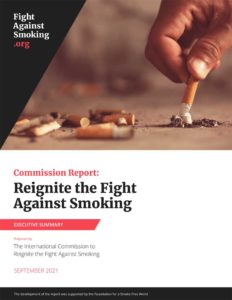Commission Urges New Ideas to Fight Smoking
- Featured News This Week
- September 22, 2021
- 0
- 1
- 2 minutes read

 New technologies that deliver nicotine without combustion present a substantial opportunity to end the death and disease associated with tobacco use, especially in low-income and middle-income countries (LMICs), according to the International Commission to Reignite the Fight Against Smoking.
New technologies that deliver nicotine without combustion present a substantial opportunity to end the death and disease associated with tobacco use, especially in low-income and middle-income countries (LMICs), according to the International Commission to Reignite the Fight Against Smoking.
In a new report, the commission offers facts, analysis and recommendations aimed at reinvigorating an effort that has stalled, “mired in an outdated paradigm that has been superseded by new technology, new ideas and new concerns for neglected communities.” The fact that there are still more than 1.1 billion tobacco users worldwide proves that the fight against smoking requires new ideas and ambition, its members note.
Among other recommendations, the commission calls for risk-proportionate tobacco policies and better access to harm reduction in LMICs (where most smokers are located). It also encourages medical bodies to reestablish the leadership role of doctors in ending smoking and urges tobacco companies to have a clear plan to phase out high-risk combustible products.
Tobacco harm reduction advocates welcomed the report. “This report thoroughly documents the global health toll of smoking, now and in a likely future,” said Donald Kenkel, Andrew Dickson White professor in the Cornell Jeb E. Brooks School of Public Policy and the Department of Economics at Cornell University.
“But the report also shows that through continuing technological innovation, tobacco harm reduction is an immediate, achievable goal. Evidence-based economic policies and regulations that support tobacco harm reduction offer real hope to help people quit smoking and improve their health.”
The report was prepared by James K. Glassman, former U.S. undersecretary of state for public diplomacy and public affairs; Rosemary Leonard, general practitioner; Kgosi Letlape, president of Africa Medical Association and president of Medical Councils of Africa; Vivan Sharan, Koan Advisory; and Tikki Pangestu, former director of research policy and cooperation at the World Health Organization.